The AMD 3rd Gen Ryzen Deep Dive Review: 3700X and 3900X Raising The Bar
by Andrei Frumusanu & Gavin Bonshor on July 7, 2019 9:00 AM EST** = Old results marked were performed with the original BIOS & boost behaviour as published on 7/7.
Benchmarking Performance: CPU Legacy Tests
3DPM v1: Naïve Code Variant of 3DPM v2.1
The first legacy test in the suite is the first version of our 3DPM benchmark. This is the ultimate naïve version of the code, as if it was written by scientist with no knowledge of how computer hardware, compilers, or optimization works (which in fact, it was at the start). This represents a large body of scientific simulation out in the wild, where getting the answer is more important than it being fast (getting a result in 4 days is acceptable if it’s correct, rather than sending someone away for a year to learn to code and getting the result in 5 minutes).
In this version, the only real optimization was in the compiler flags (-O2, -fp:fast), compiling it in release mode, and enabling OpenMP in the main compute loops. The loops were not configured for function size, and one of the key slowdowns is false sharing in the cache. It also has long dependency chains based on the random number generation, which leads to relatively poor performance on specific compute microarchitectures.
3DPM v1 can be downloaded with our 3DPM v2 code here: 3DPMv2.1.rar (13.0 MB)
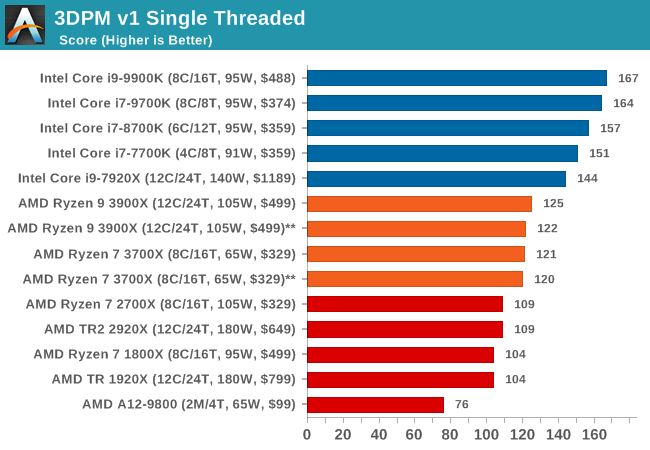
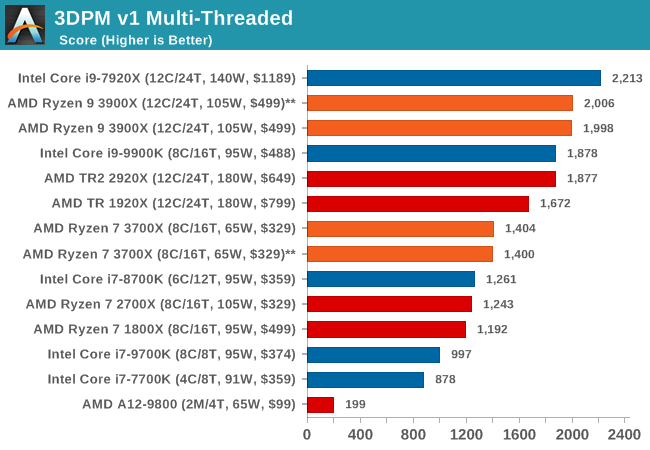
x264 HD 3.0: Older Transcode Test
This transcoding test is super old, and was used by Anand back in the day of Pentium 4 and Athlon II processors. Here a standardized 720p video is transcoded with a two-pass conversion, with the benchmark showing the frames-per-second of each pass. This benchmark is single-threaded, and between some micro-architectures we seem to actually hit an instructions-per-clock wall.
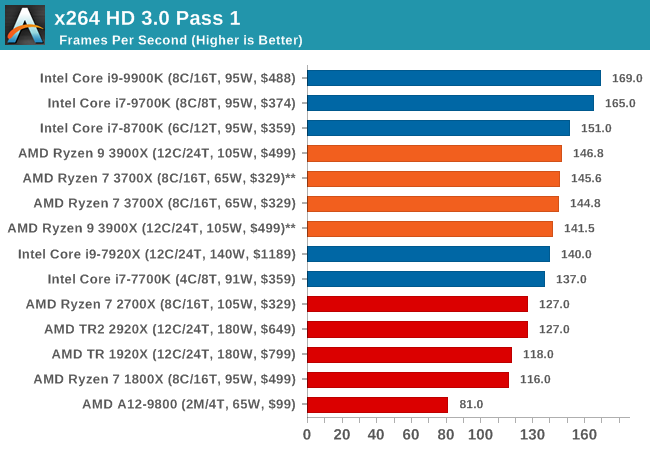
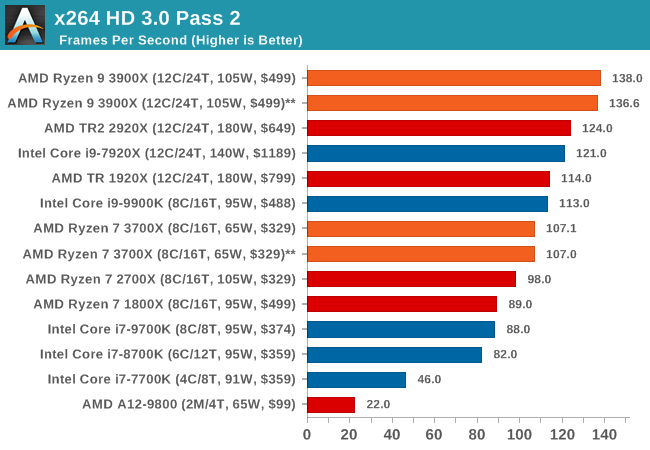
CineBench 11.5 and 10
Cinebench is a widely known benchmarking tool for measuring performance relative to MAXON's animation software Cinema 4D. Cinebench has been optimized over a decade and focuses on purely CPU horsepower, meaning if there is a discrepancy in pure throughput characteristics, Cinebench is likely to show that discrepancy. Arguably other software doesn't make use of all the tools available, so the real world relevance might purely be academic, but given our large database of data for Cinebench it seems difficult to ignore a small five minute test. We run the modern version 15 in this test, as well as the older 11.5 due to our back data.
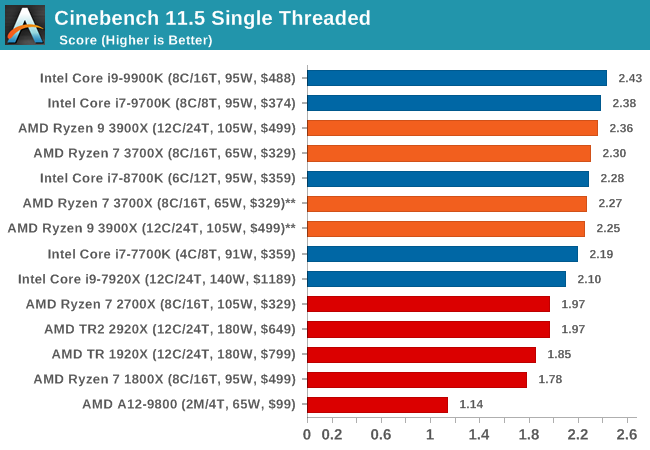
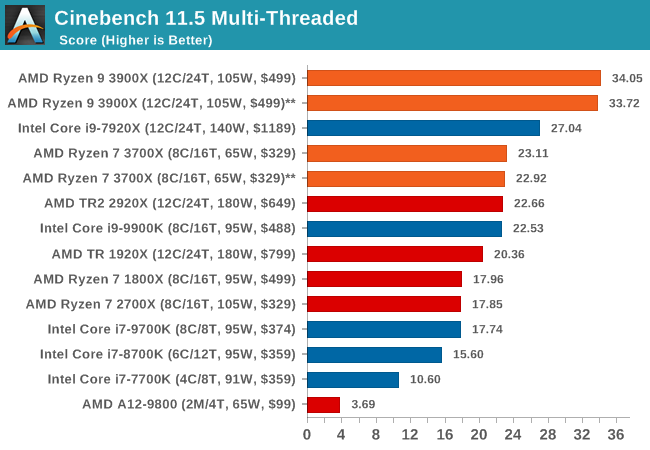










447 Comments
View All Comments
Korguz - Monday, July 8, 2019 - link
huh ???mkozakewich - Saturday, July 13, 2019 - link
"...as unfortunately the timing didn’t work out."You should increase his voltage a little and reboot, that might help.
Meteor2 - Monday, July 15, 2019 - link
It's hard to get one's head around this, but basically: *all* the Intel benchmarks *do not* include the security patches for the MDS-class flaws. The 9000 and 8000 series tests do include the OS-side Spectre fixes, but that's it. No OS-fixes for other CPUs, and no motherboard firmware fixes for any Intel CPUsAt the very least, all the Intel CPUs should be retested on Windows 10 1903 which has the OS-side MDS fixes.
Most if not all the motherboards used for the Intel reviews can also have their firmware upgraded to fix Spectre and most times MDS flaws. Do it.
This is sensible and reasonable to do: no sensible and reasonable user would leave their OS vulnerable. Maybe the motherboard, because it's a bit scary to do, but as that can be patched, it should be by reviewers.
This would result in all the Intel scores being lower. We don't know by how much without this process actually being done. But until it is, the Intel results, and thus the review itself, are invalid.
While you're at it Anandtech, each year buy the latest $999 GPU for CPU testing. Consider it a cost of doing business. Letting the GPU bottleneck the CPU on most game resolutions benchmarked is pointless.
plonk420 - Sunday, July 7, 2019 - link
mountain time zone, best time zone... 7am 7/7!exactopposite - Sunday, July 7, 2019 - link
Been waiting on this one for a long timeEris_Floralia - Sunday, July 7, 2019 - link
It's really nice to see Andrei starting to take part in desktop processor reviews and Gavin Bonshor's hardwork!mjz_5 - Sunday, July 7, 2019 - link
Intel gets 5% better FPS In games is really not a win. I’ll consider that a tie. In multiple applications AMD gets 20% more performance. That’s a win!!Dragonstongue - Sunday, July 7, 2019 - link
hopefully Anal lists :P see how much a "win" the Ryzen 3k / x5xx / Navi truly are, not only to get AMD margins even higher but to take more market share from Intel and "stagnate" Nvidia's needing to "up the price" to make more $$$$$$ when AMD "seems" to be making "as much if not more" selling a small amount less per unit (keep in mind, AMD is next Playstation and Xbox which are 99/9% likely to be using the same silicon, so, AMD take a "small hit" to get as many Ryzen gen 3 and Navi "in the world" which drums up market/mindshare which is extremely important for any business, at this stage in the game is VITAL for AMD.sor - Sunday, July 7, 2019 - link
I’m honestly wondering what the point is of the gaming benchmarks for CPU tests anymore.It seems like the game is either so easy to render that we are comparing values in the hundreds of FPS, or they’re so hard to render that it’s completely GPU dependent and the graph is flat for all CPUs.
In the vast majority of tests here one would have an identical experience with any of the top four CPUs tested.
Targon - Monday, July 8, 2019 - link
Game engines are starting to use more cores, and at lower resolutions(which do not stress the video card all that much) will show improvements/benefits of using one CPU or even platform over another. In this review, due to the RAM being used, the gaming benchmarks are almost invalid(DDR4-3200 CL16), since moving to CL14 RAM would potentially eliminate any advantage Intel has in these benchmarks.